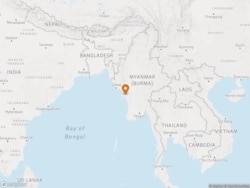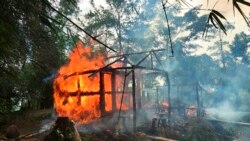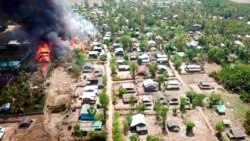With Myanmar’s ruling military preoccupied elsewhere, leaders of a Buddhist ethnic minority in western Rakhine state are establishing themselves as the effective government and security force in the state and persuading at least some Muslims that they are a better alternative than the junta.
But the development is worrying other Muslims in the state, the scene of a murderous 2017 rampage by government troops that left thousands dead and drove more than 700,000 Rohingya Muslims to flee to safety in neighboring Bangladesh.

For them, a recent series of ethnically charged incidents — including the murder of a local official — is bringing back memories of conflict between the two communities in 2012, when people were killed, houses and religious buildings were set on fire, and more than 30,000 people were forced from their homes.
In recent months, Rakhine has remained relatively peaceful despite rising violence elsewhere in Myanmar, where the military – known as the Tatmadaw – is facing popular resistance to its seizure of power in a Feb. 1, 2021, coup.
That has left an opening for a bid for power by a mainly Buddhist ethnic group known as Rakhines or Arakans, led by an armed militia known as the Arakan Army which has been fighting the central government since 2009, demanding self-determination for the Rakhine people.
Since the middle of last year, the Arakan Army has been establishing itself as an alternative government in Rakhine, inviting the public to come to it with complaints and to settle legal issues including theft, robbery and land disputes.
“We are running a sort of administration in Rakhine. Our judicial system has also been built up there. We have established a tax system,” said Arakan Army chief General Twan Mrat Naing during a Dec. 19 interview published in the Bangladeshi news outlet Prothomalo Alo.
“This is nothing new in Burma,” he added using an alternative name for Myanmar. “Almost all the ethnic groups involved in armed struggle run their own administration in their respective areas.”
Khaing Kaung San, executive director of the Wan Lark Foundation, which works to improve relations among groups in Rakhine, said the Arakan Army has been able to take advantage of a lack of effective rule in the province by the junta, made up mainly of the nation’s ethnic majority Burmese.
“No one trusts them. So most people rely on AA when something goes wrong. AA is also capable of controlling different communities to prevent getting worse when having an issue among them,” he said.
The Arakan Army is increasing efforts to gain credibility with locals. In the Prothomalo Alo interview, Twan Mrat Naing, discussing the Rohingyas and the Buddhist Rakhines, said the Arakan Army’s position is “as we are all on one side against the Burmese, we want all in Arakan to remain together.”
Most Rakhines are optimistic about the Arakan Army’s performance in Rakhine state, but some Muslims say they do not fully trust it and are concerned about a power struggle between the Arakan Army and the junta.
Village administrators and village elders from Muslim villages have been warned by the junta not to deal with the Arakan Army. Locals say the military council often arrests locals for suspected links to the insurgent force and prosecutes them under anti-terrorism laws.
Many Muslims are also worried by a wave of recent incidents, including the murder of a local government official for which a 14-year-old Muslim boy is being held. Other incidents include allegations of a plot by two Muslims to rape a Rakhine woman, and destruction of property of both Rakhines and Muslims in November and December.
In November, an Islamic school and a dormitory inside a school were burned down.
According to official figures, 13 fires broke out in Maungdaw district, which borders Bangladesh and has a large Rohingya population, between January and Nov. 25 last year. Eleven of those were in Muslim villages.
“Rakhine state seems stable. In reality, it is like a bomb that can explode at any time. There are a lot of invisible problems,” said Phone Pyae Phyo, who chairs the Arakan Students' Union. He spoke to VOA from Sittwe township.
The violence has sparked memories of clashes between the two communities in 2012 after three Muslim men raped a Burmese woman, Thida Htwe, in the town of Kyaukphyu. Violence and vandalism spread throughout the state, including the capital, Sittwe.
Leaders of the Arakan Army and its political wing, the United League of Arakan, have denounced the recent violence as “an attempt to create fears and anxieties among people.” In a formal statement, the group did not assign blame for the incidents, but promised to investigate and provide security for locals.
A similar note was sounded by U Tun Aung Kyaw, a member of central executive committee of another Rakhine-based group, the Arakan National Party.
“People from both sides are on high alert not to have sectarian violence like that in 2012. No one wants to get into trouble again,” he told VOA. “Now, unscrupulous people are using incidents to try to cause trouble again. Fortunately, leaders of both communities have tried to maintain stability.”
Despite the recent friction, for many Muslims the greater threat is from the Tatmadaw, which perpetrated the 2017 massacres and still strictly limits their movements.
They say the military has set up checkpoints at township entrances and exits and requires government permission slips, with multiple approvals, to travel beyond their townships. Muslims also say they are barred from traveling to other states and regions.
"So far, we have spent at least 250,000 kyats [$141] to get permission to go to another township in Rakhine state. We are being blocked from visiting other places,” said Maw Lawi Tun, a Muslim resident of the state capital, Sittwe.
Adul Malein, a Muslim living in Buthidaung township, said Muslims’ living conditions were deteriorating year by year. Many cannot find work and have relied heavily on International Committee of the Red Cross food assistance.
"AA came to our village and persuaded us to cooperate with them. They told us that if they succeed and completely control the state, we would have a chance and would enjoy equal rights,” Adul Malein said.
“Many are still watching the situation, even if we do not fully trust the Arakan Army,” he said, adding that they will go with the side that can create a better situation for them.
“We are afraid of both sides [AA and junta] and follow their orders because we have nowhere to go,” Adul Malien said.







